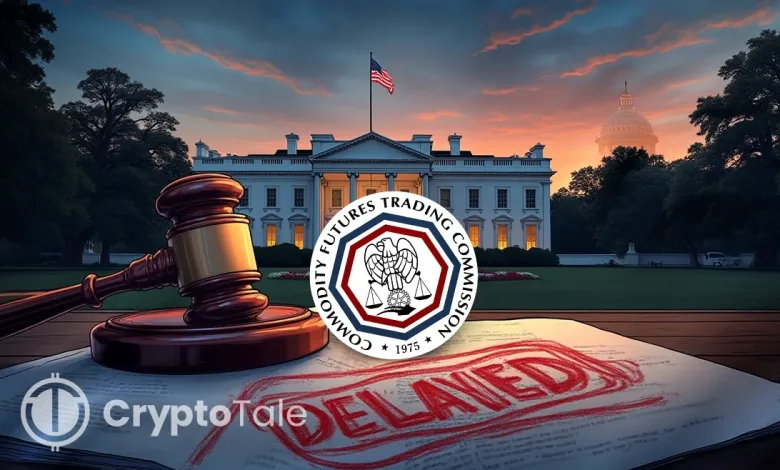White House Halts CFTC Nomination Amid Allegations of Data Misuse by Quintenz

- White House requests delay in CFTC chair vote for Brian Quintenz amid mounting scrutiny.
- Quintenz’s Kalshi ties spark ethics concerns in CFTC leadership nomination delay.
- Delay signals growing scrutiny of regulator ties to crypto industry and private firms.
The White House has requested that the Senate Agriculture Committee postpone its scheduled vote on Brian Quintenz’s nomination as Commodity Futures Trading Commission (CFTC) chair. The decision followed growing scrutiny over Quintenz’s ongoing role as a board director at Kalshi, a regulated prediction market exchange. The committee promptly removed the nomination from its agenda, citing White House intervention. No specific reason has been disclosed by the administration for the indefinite pause in the confirmation process.
Emails disclosed through a Freedom of Information Act (FOIA) request have fueled concern about potential conflicts of interest. According to the blog “The Closing Line,” these emails indicate that Quintenz’s prospective chief of staff requested access to confidential CFTC materials during a transition planning phase. These communications occurred while Quintenz remained a board member at Kalshi, which is directly regulated by the CFTC. Critics argue that such access could offer unfair advantages in a competitive market environment, particularly against rivals like Polymarket and PredictIt.
Conflict of Interest and Concerns Over Regulatory Boundaries
The controversy has reignited concerns about the revolving door between regulators and the industry they oversee. After leaving his post as a CFTC commissioner, Quintenz became a member of the board of Kalshi. His bipartisan affiliations have raised concerns about the integrity of the regulatory decision-making. Although Quintenz has vowed to leave the Kalshi board in case of confirmation, critics argue that the public’s trust in his independence has already eroded.
The emails that were obtained through the FOIA indicate that Kalshi-connected officials requested sensitive agency briefings on policy and enforcement issues. The reporting of this subject matter is noted to cover similar areas that Kalshi competes with, which instills suspicions regarding the competition. According to industry observers, in the world of prediction markets, there exists a tight regulatory path, and such confidential predictions can prove to be quite influential. Access to such information during the transition period could unintentionally shape enforcement priorities or rulemaking direction.
Strategic Delay Reflects Deeper Scrutiny in Crypto Oversight
The postponement of the vote on the nomination is a sign of a more comprehensive movement toward increased attention paid to the governance of crypto control. Although the exact reason behind this has not been revealed, there is talk in Washington that it was because of the apprehension of some interested parties in the industry. It is claimed that such a move has been lobbied heavily by the American Gaming Association and that those who would feel most concerned include big players such as the Winklevoss twins.
This development takes place as the CFTC’s role in regulating digital assets continues to expand. The Commission oversees futures and options markets, which now include growing crypto-linked instruments. The CFTC leadership is going to have a direct impact on the decentralized finance, blockchain derivatives, and prediction markets. Delaying the appointment shows the attention of administration to isolating regulatory processes by the regulators against the appearance of conflict.
Related: White House to Release Its First Crypto Strategy Report
Ethical Governance and Regulatory Firewall
The Quintenz drama may compel the legislators to revise the firewall between industry-related entities and regulatory institutions. Current rules permit former regulators to enter the private sector but lack strict controls on reverse transitions. The issues of concern touch on how regulatory ethics are maintained appropriately in case of involvement of personal affiliations upon candidacies in public service matters. The episode sheds light on the dangers of a grey area in super-rapid industries such as crypto.
According to analysts, the delay is an indicator of the beginning of a new era of increased assessment of the selection of people into agencies, especially in the technology-driven markets. The combination of prediction markets, digital financial assets, and regulatory enforcement requires more rigorous governance protection. It is also possible that the short-term decision of the White House might have a precedent on nominations in the field of financial oversight. The new environment obliges the enhancement of transparency and better delineation of the boundary between regulatory bodies and industry companies.




